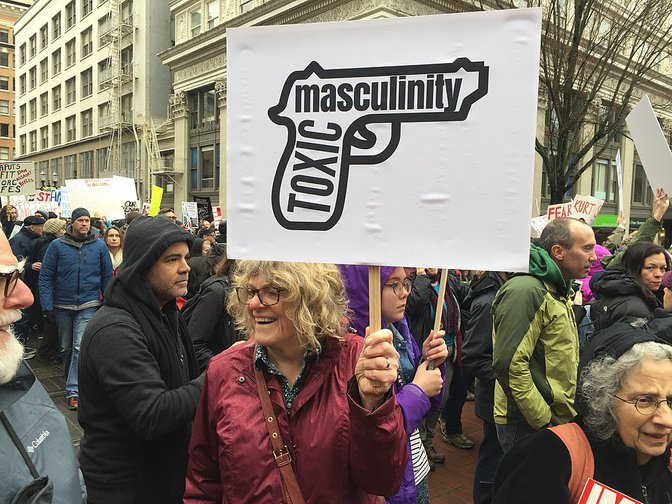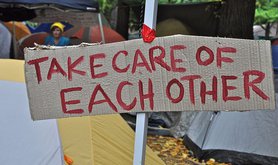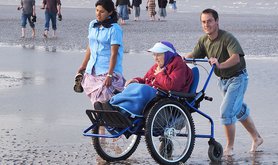
Toxic masculinity and its threat to a caring society
A growing movement has a new enemy firmly in its crosshairs: all forms of caring behavior.

We all know one - a man (of any age) who refuses to pick up a dirty dish or feed a baby. He might flick his cigarette out the car window in spite of forest fire warnings because he espouses the values of toxic masculinity. And this man is not alone.
Toxic masculinity is a growing movement that has an enemy firmly in its crosshairs: caring behavior. Caring in all forms - for family, for other people and for the environment - is anathema to those engaged in a battle to save ‘real men’ from being weakened or erased by love and empathy.
An early whiff of today’s anti-care masculinity came in 2018 when TV presenter Piers Morgan criticized new father and James Bond actor Daniel Craig for carrying his baby daughter while shopping. "Oh 007, not you as well?!!!” he tweeted, adding the hashtags “#papoose #emasculatedBond” to emphasize his disgust.
Fortunately, only a handful of responders praised Morgan for his tweet. Thousands of male Twitterers instead replied with photos of themselves with babies in tow, praising Daniel Craig for being a good Dad.
Today however, worries about the threat that caring behaviours are supposed to pose to contemporary manhood are being amplified. A startling new Penn State University study entitled Gender Bending and Gender Conformity: The Social Consequences of Engaging in Feminine and Masculine Pro-Environmental Behaviours has generated significant press coverage. It found that American men often associate pro-environmental behaviours such as recycling with ‘femininity’ or homosexuality.
Based on their work with 960 participants, the researchers discovered that men can be unwilling to perform activities such as turning down the air conditioning or separating recyclables if they feel those activities are gendered. Lead researcher Janet K. Swim concluded that there is a tendency to see environmentalism as ‘feminine.’
Furthermore, said Swim, “If being seen as heterosexual is important to a person, that person may prioritise gender-conforming over gender-nonconforming pro-environmental behaviours in anticipation of how others might see them.” In other words, for those men, it’s better to risk the future of the planet than be seen as an ‘effeminate’ or ‘gay’ environmentalist.
Politically, this gendered and stigmatized notion of caring or not caring for the environment is playing out, for example, in the sale of plastic straws in support of President Trump’s 2020 re-election campaign. “Liberal straws don’t work,” say the campaign messages and fundraising ads on social media. The inference is clear: real men (or strong people) don’t adapt their habits to the interests of the public good.
Sadly, those who subscribe to the idea that men are exempt from the imperative to care for others have role models in high places. In 2005, Donald Trump revealed his true colours to interviewer Howard Stern when asked whether he cared for his children. Trump’s response was this: “I mean, I won’t do anything to take care of them. I’ll supply funds and she’ll take care of the kids. It’s not like I’m gonna be walking the kids down Central Park.”
Today after over three years of Trump in the White House, a nationwide review of the president’s rhetoric conducted by ABC News identified at least 36 criminal cases where Trump was invoked in direct connection with violent acts, threats of violence or allegations of assault.
In the UK in early September 2019, Labour MP Jess Phillips called out Prime Minister Boris Johnson for “playing a bully-boy game” and declared that “what we have here is a game and we’re not being told what the rules are.” The image of UK House Leader, Jacob Rees-Mogg reclining on the front bench of parliament during a recent historic Brexit debate leaves no doubt about his values of respect and caring, or the lack of them.
There is a sinister thread running through these stories that speaks to a number of disturbing trends. First, it seems that for at least some men today, caring for babies, children, home and the planet is the exclusive domain of women. Secondly, that ‘real men’ are perceived to be weak or less masculine if they engage in such activities.
Yet the need for men to become carers is obvious. Today, more than 43 million Americans, eight million Canadians and seven million people in the UK care for a family member who is ill or aging. The majority of these caregivers are women, but a growing number of men are taking up caring responsibilities within the family.
Most households raising children require two incomes to live comfortably, and that blurs traditional gender roles, so caring in families is becoming everyone’s contemporary reality. However, for too many men it’s still a taboo subject. And those who do choose to position caring at the centre of their lives such as stay-at-home-Dads risk being labelled as ‘not having the guts’ to be anything else.
The untold story here is that caring is good for everyone. It gives us pleasure and it makes us healthier . But those benefits extend beyond the individual. Researcher and author of The Empathy Effect, Helen Riess maintains that the ability to connect empathically with others - to feel with them, to care about their well-being, and to act with compassion - is critical to our lives, helping us to get along and thrive as a society.
Altruistic acts in the interests of an ailing environment or family member give us satisfaction, not to mention the return of affection because caring is always a reciprocal affair - if you don’t give you don’t get. Everyone and everything needs care. If we don’t embed support for that care into public and private institutions, we risk our hopes for any sense of individual and collective wellbeing.
Are contemporary barriers to embedding the value of caring in male society too high? Are caring and ‘masculinity’ mutually exclusive? Psychologist Dr. John A. Minihan doesn’t think so. In his essay for the American Psychological Association’s magazine The General Psychologist, Minihan observes that “Power can destroy relationships; transformed by care, it can also create, nurture, guide and protect relationships. And there is no better way for a man to learn how to effect that transformation than by becoming and remaining a father.”
So the question men must ask themselves is “What kind of a person do I want to be?” They might also ask, “What kind of a friend do I want to be?” and certainly, “What kind of a leader do I want to be?”
Models of ‘tough’ guys behaving in kind and caring ways are scarce in the public domain. The Good Men Project seeks to address that gap. It taps into the natural nurturing drive of male partners and friends by celebrating ethical, caring actions at home, at work and in the community. Tom Matlack, the Project’s founder and ex-CEO, maintains that “we let guys be guys, but we do it while challenging confining cultural notions of what a “real man’ must be.”
Toxic masculinity prohibits men from participating in acts of care that reinforce our human connections, interdependence, and dependencies. If we limit caring on the basis of gender it will be impossible to create cultures of care that remind everyone how much we need one another, and how we are all worthy of care – and responsible for providing it.
The irony of shunning environmentalism is that in the face of more frequent climate-related disasters, we will need to care for each other even more carefully and closely in the future in order to recover and survive. No one is exempt from the responsibility to care in the times that lie ahead.
Read more
Get our weekly email




Comments
We encourage anyone to comment, please consult the oD commenting guidelines if you have any questions.